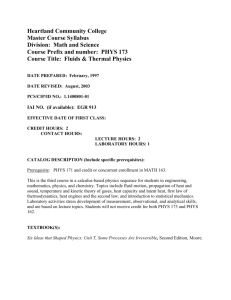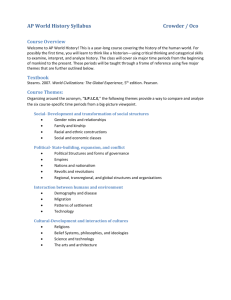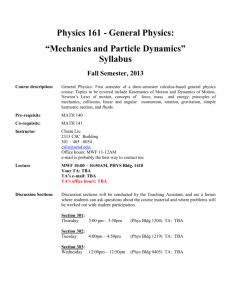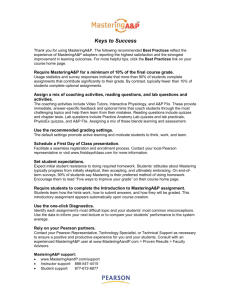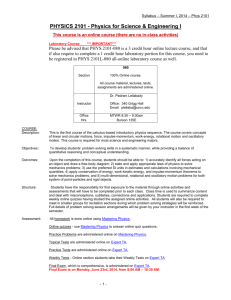PHYS 2220: Physics for Scientists and Engineers II
advertisement
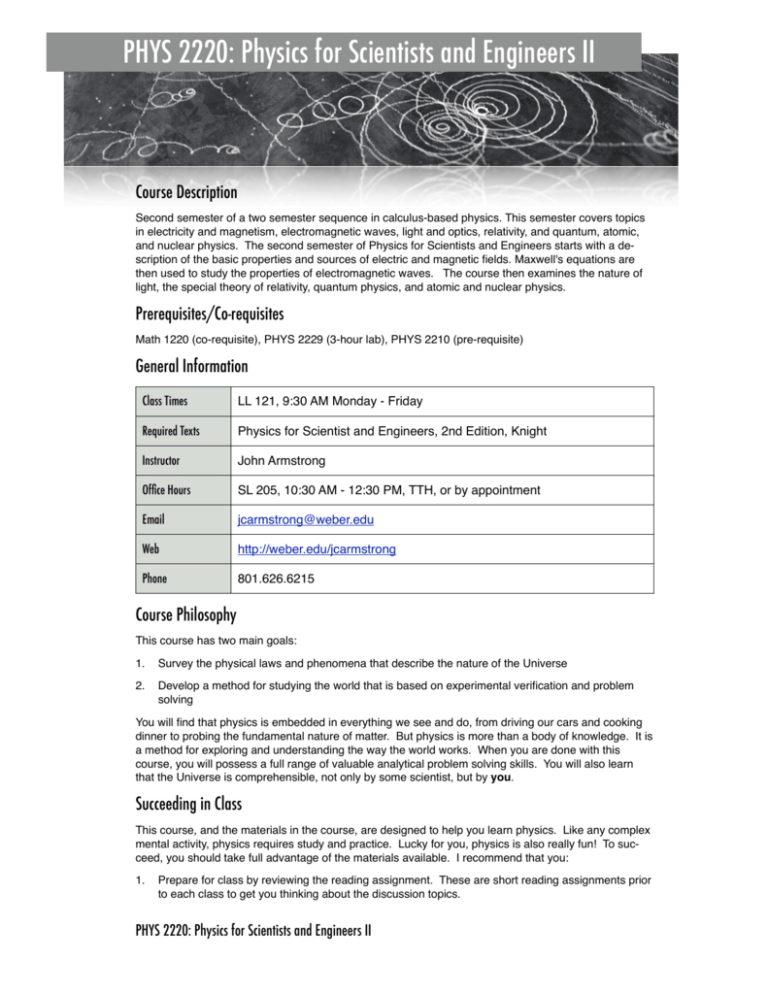
PHYS 2220: Physics for Scientists and Engineers II Course Description Second semester of a two semester sequence in calculus-based physics. This semester covers topics in electricity and magnetism, electromagnetic waves, light and optics, relativity, and quantum, atomic, and nuclear physics. The second semester of Physics for Scientists and Engineers starts with a description of the basic properties and sources of electric and magnetic fields. Maxwell's equations are then used to study the properties of electromagnetic waves. The course then examines the nature of light, the special theory of relativity, quantum physics, and atomic and nuclear physics. Prerequisites/Co-requisites Math 1220 (co-requisite), PHYS 2229 (3-hour lab), PHYS 2210 (pre-requisite) General Information Class Times LL 121, 9:30 AM Monday - Friday Required Texts Physics for Scientist and Engineers, 2nd Edition, Knight Instructor John Armstrong Office Hours SL 205, 10:30 AM - 12:30 PM, TTH, or by appointment Email jcarmstrong@weber.edu Web http://weber.edu/jcarmstrong Phone 801.626.6215 Course Philosophy This course has two main goals: 1. Survey the physical laws and phenomena that describe the nature of the Universe 2. Develop a method for studying the world that is based on experimental verification and problem solving You will find that physics is embedded in everything we see and do, from driving our cars and cooking dinner to probing the fundamental nature of matter. But physics is more than a body of knowledge. It is a method for exploring and understanding the way the world works. When you are done with this course, you will possess a full range of valuable analytical problem solving skills. You will also learn that the Universe is comprehensible, not only by some scientist, but by you. Succeeding in Class This course, and the materials in the course, are designed to help you learn physics. Like any complex mental activity, physics requires study and practice. Lucky for you, physics is also really fun! To succeed, you should take full advantage of the materials available. I recommend that you: 1. Prepare for class by reviewing the reading assignment. These are short reading assignments prior to each class to get you thinking about the discussion topics. PHYS 2220: Physics for Scientists and Engineers II PHYS 2220: Physics for Scientists andI Engineers II PHYS 2210: Physics for Scientists and Engineers 2. Actively engage through class participation. We will be practicing physics in class through demonstrations, simulations, and experiments. Read your text and come prepared to participate. 3. Practice what you have learned through the workbook exercises. 4. Re-read the reading assignment. 5. Hone your problem solving skills through homework problems. 6. Assess what you have learned with in-class exams. Reading “Quizzes” These are in-class assignments or short quizzes at the beginning of each class to see if you “got” some of the main topics from the reading assignment." Each day you’ll get one of these at the beginning of class, and they are graded out of 3 points. You get 1, just for being there and handing something in. You get 2 for being approximately, sort of close to right, and 3 points for being exactly right on. The point is to encourage you to read ahead in the text, and also to come to class. The credit for the reading quizzes is substantial (approximately 10% of your total grade), but keeping up on the material will help you (and me!) be better prepared for time spent in the classroom. Mastering Physics All of our weekly assignments will be on Mastering Physics, due at 11:59 PM on Wednesday night, when the next homework is assigned. Late submissions will not be accepted (since I will be posting solutions on Thursday morning). All of the assignments in this class will be performed online, using the Mastering Physics Website: http://www.masteringphysics.com This course will be using the Mastering Physics web resources supplied with your textbook. If you purchased a used textbook, you can purchase a subscription with a credit card on the web site. This is required for the course, as your Mastering Physics assignments will be recorded under your name in the online gradebook. The name of your course is: ARMSTRONGPHYS2220SP11. You will need this to register for our course on line. Exams There will be five equally weighted exams during the course. These serve as a measure of your 'retained' knowledge and will help you (and me) keep tabs on your progress. If you must miss and exam due to a prior commitment, you must make arrangements in advance. Makeup exams will not be given except under the most extreme circumstances. All exams will be held in LL 121 on the dates indicated. Lab Lab is a required component of this course, and you must be enrolled in a lab section. I will be doing my best to coordinate our schedule with the one in your lab, but be aware that some weeks we will cover topics after or before you cover them in lab. PHYS 2220: Physics for Scientists and Engineers II PHYS 2210: Physics for Scientists and Engineers I Grading Policy Your grade will be compiled from homework, labs, and exams according to the following: Reading “Quizzes” 10% Mastering Physics 30% Exams (5 exams @ 10% each) 50% Lab Grade 10% Attendance Policy While I will not be taking attendance in class, you are encouraged to attend regularly. This is going to be an awesome, exciting class, so why would you want to be anywhere else? Academic Integrity Regarding academic integrity, I will enforce policies as laid down in Section IV:D of the Student Responsibilities outlined in the Student Code. Specifically, no cheating or other forms of academic dishonesty will be tolerated. The first instance of cheating will result in a zero on that assignment. The second instance will result in failing the class. You will be working in groups occasionally, however, so you will be required to distinguish the difference between collaboration and cheating. When in doubt, make sure to give credit where credit is due. Special Accommodations Any students requiring accommodations or services due to a disability must contact Services for Students with Disabilities (SSD) in room 181 of the Student Service Center. SSD can also arrange to provide course materials (including this syllabus) in alternative formats if necessary. PHYS 2220: Physics for Scientists and Engineers II
